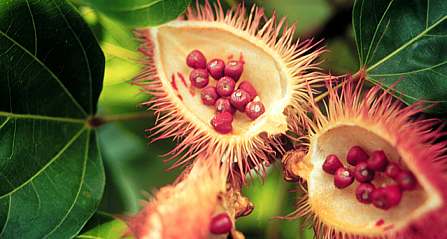
Annatto is a low, fast-growing tree, also called "achiote" in Spanish. Its arrowhead-shaped seed pods contain numerous seeds covered with a bright red-orange aril. The coloring material (bixina) around these seeds is a common natural food color used around the world, especially to color margarine.
Common Names: achiote, achiotec, achiotl, achote, annatto, urucu, beninoki, bija, eroya, jafara, kasujmba-kelling, kham thai, onoto, orleanstrauch, orucu-axiote, rocou, roucou, ruku, roucouyer, unane, uruku, urucum, urucu-uva
The main use of annatto is for digestive and stomach problems, for hypertension, for infections of the prostate and urinary tract, to lower cholesterol, and topically against skin, ear, and eye infections.
"Throughout the rainforest, indigenous tribes have used annatto seeds as body paint and as a fabric dye. It has been traced back to the ancient Mayan, who employed it as a principal coloring agent in foods, for body paints, and as a coloring for arts, crafts, and murals. Although mostly only the seed paste or seed oil is used commercially today, the rainforest tribes have used the entire plant as medicine for centuries. A tea made with the young shoots is used by the Piura tribe as an aphrodisiac and astringent, and to treat skin problems, fevers, dysentery, and hepatitis. The leaves are used to treat skin problems, liver disease, and hepatitis. The plant has also been considered good for the digestive system. The Cojedes tribe uses an infusion of the flowers to stimulate the bowels and aid in elimination as well as to avoid phlegm in newborn babies. Traditional healers in Colombia have also used annatto as an antivenin for snakebites. The seeds are believed to be an expectorant, while the roots are thought to be a digestive aid and cough suppressant."
-
Annatto tree
-
Annatto flower
-
Annatto fruit
-
Annato seeds
-
Annatto powder (condiment)
-
Making tamales mix with annatto





